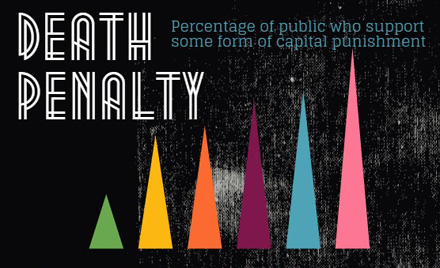Death penalty: how public views differ around the world
Support for capital punishment in Britain falls below 50 per cent for the first time on record

A free daily email with the biggest news stories of the day – and the best features from TheWeek.com
You are now subscribed
Your newsletter sign-up was successful
Support among Britons for capital punishment has fallen below 50 per cent for the first time, according to this year's British Social Attitudes Survey.
The report found that 48 per cent of the 2,878 people it surveyed were in favour of the death penalty, marking a large fall from 75 per cent in 1983, when the survey first began.
Britain legally abolished the death penalty under the Human Rights Act in 1998, although the last executions in the UK were back in 1964.
The Week
Escape your echo chamber. Get the facts behind the news, plus analysis from multiple perspectives.

Sign up for The Week's Free Newsletters
From our morning news briefing to a weekly Good News Newsletter, get the best of The Week delivered directly to your inbox.
From our morning news briefing to a weekly Good News Newsletter, get the best of The Week delivered directly to your inbox.
According to Amnesty International, 90 per cent of countries have now banned executions, but at least 22 countries carried out executions in 2013.
China does not release official figures on capital punishment, but it was estimated to have executed more people in 2013 than all other countries put together. Iran, Iraq, Saudi Arabia and the United States also feature highly on the list of countries with the most executions that year.
But what does the public think about capital punishment in other countries?
In Japan, where eight people were executed in 2013, surveys suggest that a large majority of the public is in favour of the death penalty. Meanwhile, in Australia, where nobody has been executed since 1967, just 23 per cent of people thought convicted murderers should be put to death. However, support for the death penalty rose to 53 per cent in a later poll when Australians were asked specifically about capital punishment for deadly terrorist acts. Click the image below to enlarge:
A free daily email with the biggest news stories of the day – and the best features from TheWeek.com

-
 The ‘ravenous’ demand for Cornish minerals
The ‘ravenous’ demand for Cornish mineralsUnder the Radar Growing need for critical minerals to power tech has intensified ‘appetite’ for lithium, which could be a ‘huge boon’ for local economy
-
 Why are election experts taking Trump’s midterm threats seriously?
Why are election experts taking Trump’s midterm threats seriously?IN THE SPOTLIGHT As the president muses about polling place deployments and a centralized electoral system aimed at one-party control, lawmakers are taking this administration at its word
-
 ‘Restaurateurs have become millionaires’
‘Restaurateurs have become millionaires’Instant Opinion Opinion, comment and editorials of the day
-
 Epstein files topple law CEO, roil UK government
Epstein files topple law CEO, roil UK governmentSpeed Read Peter Mandelson, Britain’s former ambassador to the US, is caught up in the scandal
-
 Iran and US prepare to meet after skirmishes
Iran and US prepare to meet after skirmishesSpeed Read The incident comes amid heightened tensions in the Middle East
-
 Israel retrieves final hostage’s body from Gaza
Israel retrieves final hostage’s body from GazaSpeed Read The 24-year-old police officer was killed during the initial Hamas attack
-
 China’s Xi targets top general in growing purge
China’s Xi targets top general in growing purgeSpeed Read Zhang Youxia is being investigated over ‘grave violations’ of the law
-
 Panama and Canada are negotiating over a crucial copper mine
Panama and Canada are negotiating over a crucial copper mineIn the Spotlight Panama is set to make a final decision on the mine this summer
-
 Why Greenland’s natural resources are nearly impossible to mine
Why Greenland’s natural resources are nearly impossible to mineThe Explainer The country’s natural landscape makes the task extremely difficult
-
 Iran cuts internet as protests escalate
Iran cuts internet as protests escalateSpeed Reada Government buildings across the country have been set on fire
-
 US nabs ‘shadow’ tanker claimed by Russia
US nabs ‘shadow’ tanker claimed by RussiaSpeed Read The ship was one of two vessels seized by the US military